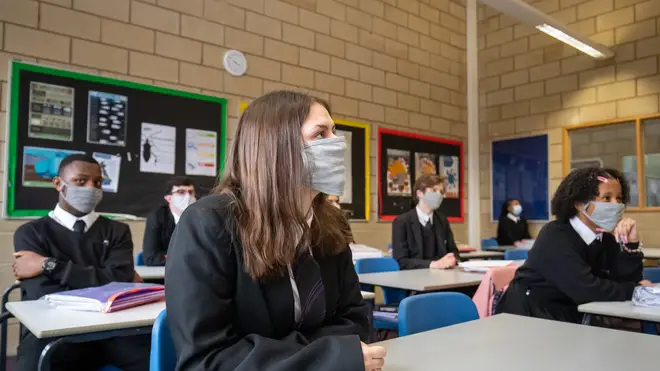
James O'Brien 10am - 1pm
28 June 2021, 05:18 | Updated: 28 June 2021, 11:18

'The government is over-testing' public health expert says
A health expert has told LBC that children are suffering and being "blamed" for surges in Covid cases, as the Government falls under increasing pressure to change guidance for coronavirus in England's schools.
Concerns have been raised over the current rules, which may require large groups of children to be sent home to self-isolate if one student tests positive, even though some health experts believe children do not play a significant role in transmission of the virus.
"What we know is children are not drivers of transmission, I don’t know how many times we want to say that," said Professor Allyson Pollock, Clinical Professor of Public Health at Newcastle University, speaking to LBC's Nick Ferrari.
"They reflect the community prevalence but they are not key drivers of transmission and they’re being blamed unnecessarily and targeted."

Furious parent is fed up with school self-isolation rules
Professor Pollock also said that the Government was "overtesting" by recommending that children take two rapid Covid-19 tests each week.
She said: “One of the biggest problems is that the Government is overtesting at the moment.
"It’s using lateral flow tests, these rapid tests, in children twice weekly, and there’s no evidence at all that these tests, which they’ve been using for over a year now, are stopping transmission."
She added: "You should not be rolling out lateral flow testing and mass testing without having done good evaluations of the costs, the benefits, and the harms, and what we’re seeing is enormous harms with children losing huge amounts of school, not just through the epidemic but now as well."

Nick Ferrari discusses the 'farcical' school self-isolation rules
Primary school headteacher Dr Victoria Carr told LBC that schools just needed clear guidance from the Government, and for it to be issued in time to make any necessary changes.
"What we need really is just some clear guidance from the Government," said Dr Carr.
"We're happy to do whatever the Government tell us, for safety and to protect our community which we've done now for over a year really well.
"But we just need that guidance as soon as possible so we know what to do."

Primary school headteacher talks about Covid isolation in schools
The Government has been under increasing pressure to change the self-isolation guidance in English schools.
The latest figures from the Department of Education showed that 2.3 per cent of all state school students were self-isolating because of possible exposure to Covid-19 in school, as of 17 June.
This is up from 0.5 per cent on 10 June.
It translates to about 172,000 students self-isolating because of potential contact with a positive case – of which, in schools, there were around 9,000.
Read more: More questions to answer over Hancock resignation, says Keir Starmer
Read more: Thousands gather in central London for outdoor rave amid weekend of protests
With all adults in England, Wales and Northern Ireland over the age of 18 now eligible to book their coronavirus jabs, there are worries that surges in infections amongst unvaccinated students will lead to more pupils having to self-isolate, resulting in even more missed education.
Among those calling for a change to the Government’s Covid-19 guidance is Tim Spector, principle investigator for the Zoe Covid Study app.
He tweeted: “Now that COVID is endemic and most susceptible people are protected - it makes no sense to keep sending masses of kids home and mess up their education when one case occurs and their risk is tiny.”

Currently, the Government advice says that schools must “minimise contact with individuals who are required to self-isolate by ensuring they do not attend school”.
If a pupil has symptoms, tests positive, or comes into close contact with a positive case, they must isolate at home for 10 days like the rest of the population.
Read more: French police hunt Tour de France spectator who caused major crash with sign
Read more: New Health Secretary Sajid Javid's top priority: return to normal 'as quickly as possible'
Whilst cases in secondary schools are slightly more manageable, in primary schools where social distancing between students is much more difficult a single positive case can result in entire “bubbles” – or even year groups – being sent home.
This has knock on effects for parents, many of whom may need to either arrange childcare at short notice or take time off work.
There are also worries that, after an already-tumultuous 18 months, being sent home will cause yet more disruption to students’ education.